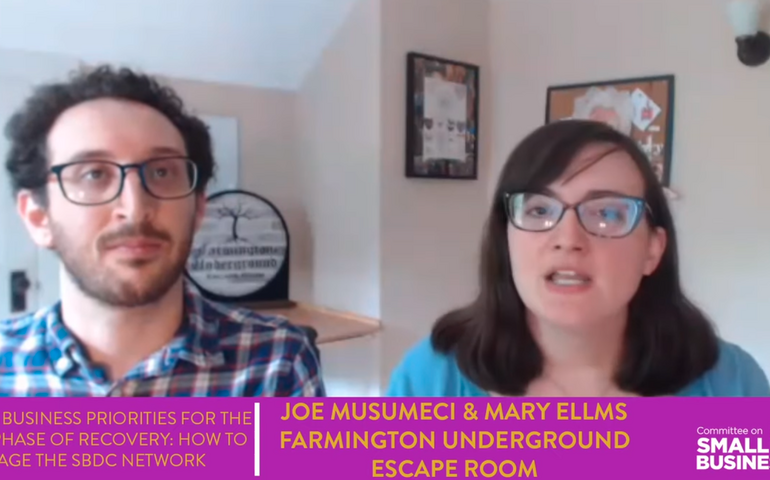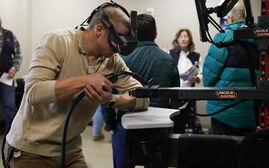Mainers push for SBDC update, to boost COVID-19 small business survival
 Image / YouTube
Joe Musumeci and Mary Ellms, owners of the Farmington Underground Escape Room, testify before the U.S. House Small Business Committee Thursday about how the Small Business Development Centers have helped them transition during the pandemic.
Image / YouTube
Joe Musumeci and Mary Ellms, owners of the Farmington Underground Escape Room, testify before the U.S. House Small Business Committee Thursday about how the Small Business Development Centers have helped them transition during the pandemic.
More Information
Mary Ellms and Joe Musumeci were about to celebrate the second anniversary of their business, the Farmington Underground Escape Room, when the COVID-19 pandemic hit.
They opened in March 2018, and the businesses model — which confines groups of people in indoor rooms as they solve puzzles to figure out how to "escape" — wouldn't work during the pandemic shutdown.
"We are first-time business owners and we've spent the past couple of years really problem solving and trying to figure out every little problem as it comes along," Ellms told the U.S. House Small Business Subcommittee on Contracting and Infrastructure Thursday. The couple turned to their local Small Business Development Centers for help with the shutdown, a business crisis that was too big for them to handle alone.
The pair testified at a virtual hearing by the subcommittee, chaired by Rep. Jared Golden, D-Maine 2nd District. The committee is working to get the Senate to pass the Small Business Development Centers Improvement Act, which Golden sponsored and was passed by the House in October. The act increases the money available for SBDCs by $40 million, to $175 million a year from 2020 through 2023. The $136 million annual allotment the program now has was set when it was last reauthorized in 2006.
The bill also allows SBDCs to market their services, which, Golden and Mark Delisle, head of the Maine Small Business Development Centers, said, will broaden their reach and give businesses in rural areas more access. The centers provide free or low-cost resources and advice to small-business owners.
"Now that we have a business adviser, we really are seeing the value of someone that we can talk to for advice, someone who can get to know our business and someone who can get to know us personally," Ellms said. Their adviser not only walked them through the SBA loan process as they applied for an SBA Economic Injury Disaster Loan, but also helped them devise a way to bring their business outdoors.
Farmington Underground is now working with historical societies, local theaters and other community organizations to devise local treasure hunts based on the same problem-solving and communication techniques their escape rooms were.
The couple is not alone as businesses across the state and the country work to find ways to navigate the pandemic and its fallout.
A year's worth of clients in two months
Delisle told the committee that the state's 22 centers have advised 1,340 clients since March 1. It usually sees about 1,500 a year. It's helped those clients find $10 million in capital, $4.8 million of that through Payroll Protection Program loans and $1.4 million through the EIDL program. He said it will likely take businesses 12 to 18 months to recover.
The state has 147,000 small businesses, Delisle said. "It's really critical we help as many of them as possible recover and sustain themselves after this crisis is over," he said.
The centers, with help from the federal CARES Act, are adding advisers, specialists and resources. "We have a laser focus right now on small businesses and helping them relaunch and recover," Delisle said. Work ranges from help navigating the PPP and SBA loans, to issues related to reopening, like how to get protective equipment, to how to manage the 14-day quarantine for out-of-state visitors.
"I don't think there's a single business model that doesn't need to change," he said. He said that SBDC advisers can help business owners, like Musumeci and Ellms, think of creative ways to keep their business going.
Bruce Strong, SBDC director for Minnesota, said, "We're pretty good at thinking outside the box and helping business owners think outside the box. I've been amazed at how quickly small businesses adapted to the issues they were facing."
Delisle said, specifics aside, the biggest role the SBDCs have is "helping a small business owner understand how to run a business."
He and Strong stressed that long-term solutions are important. "Even the U.S. government can't provide enough money to fund and save every one of the 30 million small businesses in the country," Strong said.
Looking at the long game
Charles Rowe, national director of the SBDC, said the strategy is "respond, recover, resilience and reinvention." Currently, businesses are moving from respond to recover.
He said that Congress can help by pass the PPP Improvement Act, offering tax credits for reopening expenses and passing the SBDC Improvements Act that Golden authored.
Golden said that the SBDC reauthorization would help businesses once emergency funding and other measures to tackle the crisis are through. "Even if you open the economy tomorrow, it's going to take longer to recover," he said.
He said that among the increased resources for the centers is a provision that allows them to market, which they aren't authorized to do. "It's a great service, but if you don't know the service is out there, many small businesses are missing out."
He said the service the SBDCs provide is crucial to small businesses, which made the CARES Act funding for more resources at the centers important, but also makes it important that the Senate pass the act to reauthorize the program.
"I want to see you help more people like Joe and Mary in Maine, but also every state across the country right now," Golden told the SBDC representatives.
He said wherever businesses are between respond and recover, "I think you have to be committed for the long game as we work to recover from this economic crisis, and I think the work you do is going to be so important here, which is why I want to see that legislation pass through the Senate and get to the president's desk for his signature."
He said he's also committed to making sure SBDCs continue to get funding from ongoing congressional efforts to respond to the pandemic.














0 Comments